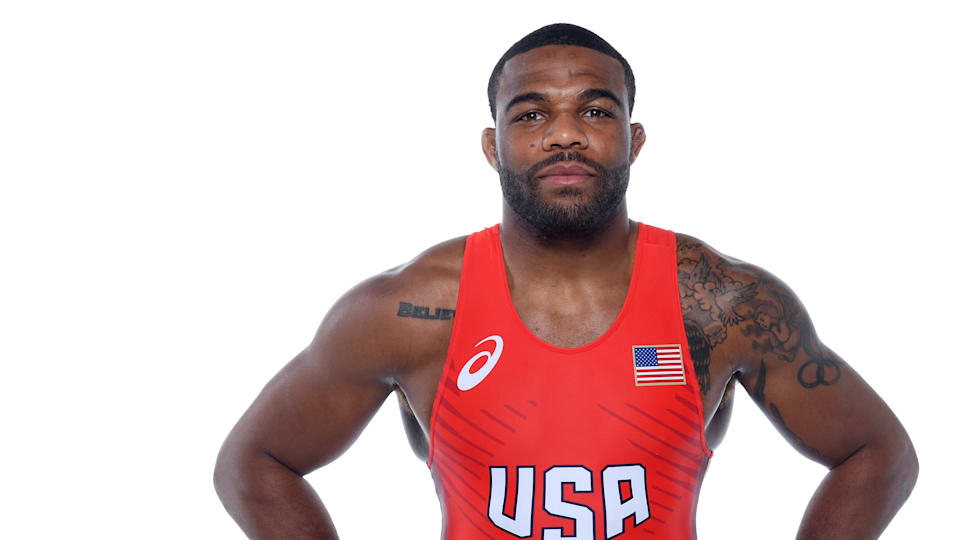How Jordan Burroughs used mindfulness to move on from Rio 2016 despair
Find out how the two-time wrestling Olympic champion learned to process defeat in Olympic State of Mind, the new Team Bridgestone Olympic Channel experience.

Jordan Burroughs is a freestyle wrestling icon.
The United States grappler is a four-time world champion, and will be hoping for a second Olympic gold medal at Tokyo 2020.
But the many highs of Burroughs' career are interlaced with several disappointing moments.
As part of new Team Bridgestone Olympic Channel experience Olympic State of Mind, Burroughs demonstrates how he uses mindfulness, visualisation, and motivation to both succeed on the mat, and cope with hard times.
Anyone can use these techniques in their daily life, and the goal of Olympic State of Mind is to help people to be the best version of themselves, through interviews with elite sports stars and medical professionals, informative articles, quizzes, and interactive games.
Being 'intentional and deliberate' through visualisation
Visualisation helps Burroughs complete every task with purpose, and in wrestling, that often means preparing for pain.
By imagining the discomfort he will likely put himself through in a workout or bout, the 31-year-old is able to decrease the effects of knocks he takes when performing.
"You look at it head on and say, 'Listen, I know this is gonna hurt, but I'm prepared for it'" - Jordan Burroughs to Olympic Channel.
"Every week our coaches give us our training schedule. Monday is going to be just a drill. Tuesday is going to be a little bit of sparring, a little bit of technique. But Wednesday, we know this and we're hitting it hard.
"We're gonna do sprints, conditioning when lift weights and we're going to wrestle a ton. I think within those moments you start to condition your mind to say, "OK, this is gonna be a very difficult day for me, but I want to get the most out of it."
The second benefit of visualisation for Burroughs, is ensuring that his workouts are efficient as possible.
"And we think about the Olympic Games, only two days, four matches, six minutes apiece. That's 24 minutes. You've done thousands of hours of training throughout the entire year of 19 and 20. Just for 24 minutes of wrestling."
"I want to be intentional and deliberate because I'll never be able to get this day back."
Mindfulness and accepting fear
There's an old saying in sport that more is often learnt in defeat than victory, and so it proved for Burroughs.
After winning three world titles and gold at London 2012 with a remarkable 130-2 win record in international competition, he was brimming with confidence going into the defence of his Olympic crown at Rio 2016.
But defeat in the quarter-finals to Russia's Aniuar Geduev burst the New Jersey native's bubble before a resounding 11-1 defeat in his first repechage bout to Bekzod Abdurakhmonov of Uzbekistan.
One of Team USA's great hopes for gold returned home empty-handed, with Burroughs turning to mindfulness to emerge from his pit of despair.
"Mindfulness for me really started after Rio. Up until that point, I had never really had to draw on my emotions when I've had such a negative situation or circumstance occur to me on the day of competition.
"This was the most devastating loss that I had ever taken in my career. And so I was like, if I'm going to come back, I'm going to refine myself both physically but also psychologically and spiritually." - Jordan Burroughs to Olympic Channel
"I have to feel the negative emotions. You have to figure out whether it's fear or negativity, anxiety, or pressure, or just a difficulty of being in a position where you've got something really big in front of you that you're trying to do.
"I think the best athletes in the world are the people who can control their emotions. And controlling them doesn't mean just blocking them out completely. It means feeling them and acknowledging them, but also not letting them affect your performance."
Part of Burroughs' mindfulness training was learning to accept defeat is sometimes out of his control.
"You can't always win. Everyone can't win. And there have been times where I've done everything right leading up to a major event and I still got beat.
"Maybe this guy was just really prepared. He did things right and it just wasn't meant for you. So for me, I've had more of a spiritual approach to my match-ups.
"It wasn't meant for you. You get an opportunity to try to do it again."
"I believe in releasing any pressure that's been heaped upon me and I try to just operate from a state of just thankfulness and gratitude."
That change in mental approach certainly helped Burroughs rebound from that Rio disappointment.
A year later in Paris, he exacted revenge on Abdurakhmonov to reach the final of the World Championships.
He then beat Khetag Tsobolov of Russia to claim his fourth world title.
How to tap into Jordan Burroughs' Olympic state of mind
The interactive experience is now live on Olympic Channel.
Keep an eye out for the video clips, articles, quizzes and games for you to watch, read, and play, plus a special episode of the Olympic Channel Podcast.
